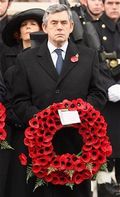 Poppy day came early to Westminster today. Brown began proceedings by reciting the names of the 37 men killed in Afghanistan over the summer. This took two minutes. The house was silent, funereal, almost awe-struck with the solemnity of the occasion. Brown looked like a man deeply moved by personal grief as he worked his slow way through the deadly list.
Poppy day came early to Westminster today. Brown began proceedings by reciting the names of the 37 men killed in Afghanistan over the summer. This took two minutes. The house was silent, funereal, almost awe-struck with the solemnity of the occasion. Brown looked like a man deeply moved by personal grief as he worked his slow way through the deadly list.
Ann Winterton punctured the mood with the first question, suggesting that once the Lsibon treaty is ratified the government’s first duty will be ‘to further the objectives of Europe in preference to those of Britain’. Brown denied this again referenced the Afghan conflict in response.
When his trun came, Cameron had no choice but to add his sympathies and to engage constructively in the debate about the war budget. He asked about rehabilitation services and the mental health of veterans. The PM blandly assured him that everything possible was being done for our service personnel. Cameron then quoted a member of the TA who claims he’s being paid for only half the training days he must complete before his deployment. This makes a mockery of Brown’s promise about adequate funding. But the mood of the house restrained Cameron from making a fight of it. You can’t have a punch up at a memorial service.
Nick Clegg rose. Even before he’d said a word he was howled at enthusiastically by both sides. Somehow he brings out the inner bully in his opponents. He wondered why our troops were being sent to fight for the ‘deeply corrupt’ regime in Kabul. Brown asked him to wait for the final result of the presidential election and pointed out, rightly enough, that the troops’ great achievement is to have enabled an election to take place at all. Clegg pursued him with a novel idea. Brown should phone up Karzai and order him to form a government of national unity. Lovely plan, but Brown isn’t Afghanistan’s head of state. Perhaps it’s this high-mindedness and impracticality that encourages MPs to shout nasty things at Clegg.
After the party leaders had spoken, the debate turned to parochial matters. The girl guides were congratulated on their centenary. Stingy banks were scolded for not lending cash more readily. The MP for Ayr fretted about a smoky new power station. Gordon Prentice told the house that his local A&E had gone missing and he wanted it back. Shivering pensioners were mentioned, and the PM reassured us that thanks to his winter fuel allowance they could turn on the second bar of the electric fire. Great! The Commons seemed to have turned into an impotent local council. In other words, Ann Winterton’s prediction had already come to pass. Certainly it seems strange that our troops are fighting in Afghanistan to defend us ‘on the streets of Britain’ while our sovereignty is being meekly surrendered in the corridors of Whitehall.
In the closing seconds, the session finally caught fire. Sir Michael Spicer tilted at the PM with one of his lethal short thrusts. ‘Will he confirm that he will soldier on to the bitter end?’ Brown began, ‘We have got a programme for government …’ but he was immediately engulfed with Tory laughter.
Effectively the shift of power has already taken place. In a BBC interview just before PMQs, Theresa May was asked about rising unemployment and she spoke of Tory plans for business. ‘We’re bringing in James Dyson,’ she said, ‘we’re stimulating entrepreneurship’ and so on. Throughout she used the present tense. The assumption that political authority now lies with the Tories wasn’t challenged by her opposite number in the studio, John Hutton. In fact, he didn’t even notice it.







Comments